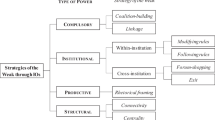Abstract
Building public support for the use of force has become a primary preoccupation for presidents in the post-Vietnam era. Rather than let popular opposition to military actions fester, they pay special attention to public opinion and they attempt to orchestrate these actions in a way that enhances mass support. These strategies and tactics are often aggressive in nature, involving prime-time television appearances, high-profile speaking tours, and a concerted effort by the president's foreign policy advisors to echo the messages delivered by the commander-in-chief. The effect of these actions has been the subject of past research. Unlike other studies of the effects of presidential speeches (Ragsdale, 1984, 1987; Brace and Hinckley, 1992), this one focuses on changes in substantive policy opinion, as opposed to changes in presidential approval. A before/after survey design that incorporates a control group that was not exposed to Ronald Reagan's October 27, 1983 speech on the use of U.S. troops in Lebanon and Grenada reveals that public support for each of these policies increased following the speech. It also reveals that support increased more for Grenada than for Lebanon. The result is consistent with findings by Jentleson (1992) that support is more likely to follow the use of troops to repel a state's violation of another's sovereignty than the use of troops to resolve a political conflict internal to a single sovereign state.
Similar content being viewed by others
REFERENCES
Brace, Paul, and Barbara Hinckley (1992). Follow the Leader. New York: Basic Books.
CBS/NYT (1983). National Poll on Lebanon and Grenada.
Cannon, Lou (1991). President Reagan: The Role of a Lifetime. New York: Simon & Schuster.
Cohen, Jeffrey E. (1995). Presidential rhetoric and the public agenda. American Journal of Political Science 39: 87-107.
Conover, Pamela J., and Lee Sigelman (1982). Presidential influence and public opinion: The case of the Iran Hostage Crisis. Social Science Quarterly 63: 249-264.
Gilboa, Etyan (1990). Effects of televised presidential addresses on public opinion: President Reagan and terrorism in the Middle East. Presidential Studies Quarterly 20: 43-53.
Grieves, Forest L. (1977). Conflict and Order. Boston: Houghton Mifflin Company.
Jentleson, Bruce W. (1992). The pretty prudent public: Post-Vietnam American opinion on the use of force. International Studies Quarterly 36: 49-74.
Kernell, Samuel (1993). Going Public: New Strategies of Presidential Leadership. Washington, DC: CQ Press.
Mueller, John (1973). War, Presidents, and Public Opinion. New York: Wiley.
Noelle-Neumann, Elisabeth (1986). The Spiral of Silence: Our Social Skin. Chicago: University of Chicago Press.
Page, Benjamin I., and Robert Y. Shapiro (1992). The Rational Public: Fifty Years of Trends in American Policy Preferences. Chicago: University of Chicago Press.
Page, Benjamin I., Robert Y. Shapiro, and Glenn R. Dempsey (1987). What moves public opinion? American Political Science Review 81: 23-43.
Postol, Theodore A. (1991–92). Lessons of the Gulf War experience with Patriot. International Security 16: 119-171.
Quattrone, George A., and Amos Tversky (1988). Contrasting rational and psychological analyses of political choice. American Political Science Review 82: 719-736.
Ragsdale, Lyn (1984). The politics of presidential speechmaking, 1949–1980. American Political Science Review 78: 1949-1980.
Ragsdale, Lyn 1987. Presidential speechmaking and the public audience: Individual presidents and group attitudes. Journal of Politics 49: 704-736.
Reagan, Ronald Wilson (1983). Public Papers of the President. pp. 1517-1522.
Sigelman, Lee (1980). Gauging the public response to presidential leadership. Presidential Studies Quarterly 10: 427-433.
Sigelman, Lee, and Alan Rosenblatt (1996). Methodological considerations in the study of presidential influence. In Diana Mutz, Paul Sniderman, and Richard Brody (eds.), Political Persuasion and Attitude Change (pp. 171-192). Ann Arbor, MI: University of Michigan Press.
Zaller, John R. (1992). The Nature and Origins of Mass Opinion. New York: Cambridge University Press.
Author information
Authors and Affiliations
Rights and permissions
About this article
Cite this article
Rosenblatt, A.J. Aggressive Foreign Policy Marketing: Public Response to Reagan's 1983 Address on Lebanon and Grenada. Political Behavior 20, 225–240 (1998). https://doi.org/10.1023/A:1024862507232
Issue Date:
DOI: https://doi.org/10.1023/A:1024862507232




